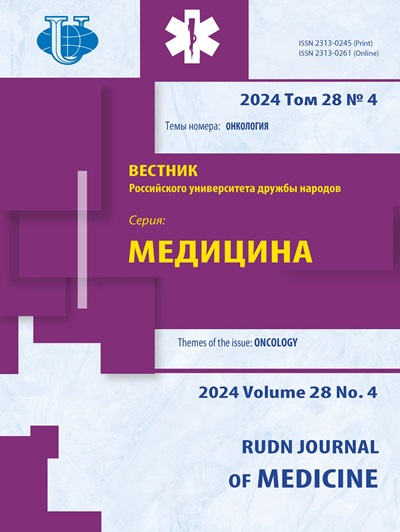Conservative treatment of complications after integrated therapy of bladder cancer
- Authors: Kaprin AD1, Ivanov SA2, Garmash SV2, Shestakov AV2
-
Affiliations:
- City Clinical Hospital № 20
- Russian Scientific Center of Roentgenoradiology (RSCRR)
- Issue: No 4 (2011)
- Pages: 76-79
- Section: Articles
- URL: https://journals.rudn.ru/medicine/article/view/3565
Cite item
Full Text
Abstract
Aim: to evaluate efficacy of systemic and local ozone therapy for correction of radiation complications after complex therapy of bladder cancer.
Materials & methods: 25 patients with bladder cancer at the stage T2-Т3аN0M0 treated in FSI Russian Scientific Rentgenradiology Centre (from 2003 to 2008) were included in the study. The first group (12 patients) for the treatment of late complications received complex therapy for 3 months, the second group (13 patients) - standard symptomatic therapy.
Results: the control study in 12 months showed a significant decline of total score of IPSS and QoL in the first group in comparison with the second one (17.5 ± 5.2 vs 23.5 ± 6 and 3.1 ± 1.1 vs 3.8 ± 1.5, respectively).
Conclusions: for prevention and correction of radiotherapy complications of bladder cancer it is necessary to use additional methods of treatment including ozone therapy and pharmacotherapy which permit to improve the quality of patient's life.
Materials & methods: 25 patients with bladder cancer at the stage T2-Т3аN0M0 treated in FSI Russian Scientific Rentgenradiology Centre (from 2003 to 2008) were included in the study. The first group (12 patients) for the treatment of late complications received complex therapy for 3 months, the second group (13 patients) - standard symptomatic therapy.
Results: the control study in 12 months showed a significant decline of total score of IPSS and QoL in the first group in comparison with the second one (17.5 ± 5.2 vs 23.5 ± 6 and 3.1 ± 1.1 vs 3.8 ± 1.5, respectively).
Conclusions: for prevention and correction of radiotherapy complications of bladder cancer it is necessary to use additional methods of treatment including ozone therapy and pharmacotherapy which permit to improve the quality of patient's life.
Keywords
About the authors
A D Kaprin
City Clinical Hospital № 20City Clinical Hospital № 20
S A Ivanov
Russian Scientific Center of Roentgenoradiology (RSCRR)Russian Scientific Center of Roentgenoradiology (RSCRR)
S V Garmash
Russian Scientific Center of Roentgenoradiology (RSCRR)Russian Scientific Center of Roentgenoradiology (RSCRR)
A V Shestakov
Russian Scientific Center of Roentgenoradiology (RSCRR)Russian Scientific Center of Roentgenoradiology (RSCRR)
References
















